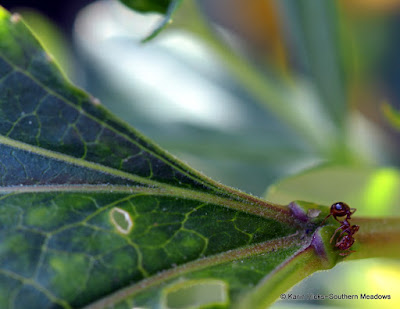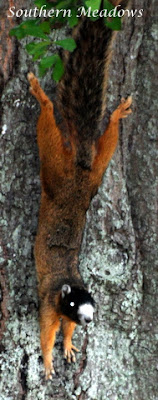Have you ever sat down in front of a plant and just observed all the activity that goes on there? My children and I recently did this as part of a homeschool assignment and it was fascinating to see all the life on our passion vine (passiflora incarnata).
A female Variegated Fritillary butterfly visits to lay eggs. First landing, then touching with her feet to "taste" that this is indeed the right plant to support her offspring. Then with gentle intent she deposits eggs on the underside of the leaves.
Other butterflies have been here already, before her. There is the obvious caterpillar munching away at the leaves. It is a host plant for several butterflies including the Gulf Fritillary and Variegated Fritillary and if you are further south than we are, you may find Zebra Longwing or Julia Heliconian caterpillars.
 |
| Gulf Fritillary caterpillar |
 |
| Variegated Fritillary caterpillar |
In fact, upon close observation, we find lots and lots of caterpillars in various instars. Sometimes alone on a single leaf and other times munching away in unison on a shared spot.
But there are other less familiar visitors to this vine. Several ants busily run up and down the stalks. They stop at the base of a leaf and start madly crawling around in circles. They are visiting the extrafloral nectaries (EFN), nectar producing glands that are separate from the flower.
 |
| ants collecting sweet liquid from extrafloral nectaries |
Reading up on EFNs, studies indicate that they are used by plants to attract beneficials such as ants and beetles by secreting glucose, fructose, sucrose, protein and amino and organic acids. This is one way the plant protects itself and improves its survival and reproduction success. Sometimes referred to as host-plant
resistance.
 |
| lady beetle larvae finding nectar at extrafloral nectaries |
Stripped cucumber beetles run around the tops and underside of the leaves. They prefer vining plants such as cucumber, pumpkin, and squash but they will eat just about anything they can find. They are thought of as a garden pest primarily because they chew on the leaves and are largely responsible for bacterial wilt. If they were in my vegetable garden I might spray an organic soap on them but the cucumber beetles will get a pass this time because the passion vine is populated with far too many caterpillars and I wouldn't risk their survival. More importantly the cucumber beetles may be lunch for a wolf spider, ground beetle or even a bat.
 |
| stripped cucumber beetle |
Other flying insects, such as flies and wasps make brief pit stops to check things out before departing in search of a meal elsewhere.
 |
| banded robber fly |
Life on a passiflora is in no way dull. There is constant activity. Every insect interacting with the plant with their own resolve. Take a moment to observe the plants in your garden. How are they supporting your ecosystem? You may be surprised what you find there.










.png)
